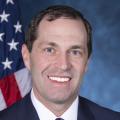Jefferson County
Not in Jefferson County? Find your state's guide.
Election Day is Tuesday, November 3!
The Progressive Voters Guide compiles the information that allows you to make informed decisions about the races on your ballot based on your values. Vote in every race! It’s our right and responsibility. Browse the categories at the left or select “Choose My Guide” to see races specific to you. And please share this guide with your friends and family.
Federal
Joe Biden is one of the nation’s most experienced public servants, having served as a U.S. senator from Delaware for 36 years and the U.S. vice president for eight years. Biden is running on a comprehensive progressive platform.
Biden has championed individual rights throughout his career — from spearheading the Violence Against Women Act to passing laws that expanded the definition of hate crimes to include those based on gender, sexual orientation, gender identity, and disability. Biden led the fight to pass the Brady Bill, which established the national firearms background check system, and helped secure a 10-year ban on assault weapons from 1994-2004. As vice president, Biden oversaw the implementation of one of the largest economic recovery plans in American history in 2009, saving the American automobile industry and millions of American jobs in all sectors of the economy. During the Obama/Biden administration, the United States made significant progress toward a clean energy economy and provided health coverage to millions of Americans via the passage of the Affordable Care Act — a law Biden has vowed to expand and improve.
If elected president, Biden has pledged to work to reverse the damage from the last four years of partisan obstruction and executive branch policies solely benefiting the wealthy and well-connected. Biden supports a $15-per-hour minimum wage and 12 weeks of paid family and medical leave for all workers. He also seeks to address the country's racial wealth disparity, equal opportunity, and jobs gaps by empowering small-business creation and expansion in economically disadvantaged areas. On the climate crisis, Biden proposes net-zero CO2 emissions in the U.S. by 2050 and rejoining the Paris climate accords. On the immediate front, Biden has proposed a national crisis response to the COVID-19 pandemic. Biden’s experience handling the economic recovery with Obama after the Great Recession of 2009 will inform his actions to help individuals, families, small businesses, and local and state governments that are struggling badly as a result of the botched response to the pandemic. Biden will restore the long-standing precedent that public health decisions are best made by public health professionals.
Biden has pledged to defend abortion rights, expand and protect union membership, bring together an equitable and diverse group of experts to handle the nation’s institutional racism crisis, and restore dignity to the office of president of the United States.
Biden is the clear presidential choice for progressive voters.
In this election, he faces Donald Trump — considered by progressives to be the most corrupt, incompetent, anti-progressive president in recent memory and perhaps in American history. Trump’s biggest achievement as president was forcing through a massive tax cut that overwhelmingly favored the wealthiest Americans, making the nation’s historic income-disparity problem even worse. Trump unilaterally withdrew from the Paris Climate Accords, making the U.S. one of very few countries that are not signatories. Trump’s administration has encouraged repeated unsuccessful attempts by Congress to repeal the Affordable Care Act, which has provided health coverage to millions of Americans, including a federal court challenge in the midst of the COVID-19 pandemic to dismantle the law. Trump has supported racist immigration practices that contravene international law on the treatment of refugees.
Trump’s decisions have trickled into even the most mundane things, affecting Americans on a daily basis. Trump scrapped a bill requiring airlines to disclose bag fees, blocked consumers from suing banks, ignored the growing crisis over student loans, lifted bans on transferring military equipment to local law enforcement which has exacerbated police-citizen conflicts, particularly in relation to Black Lives Matter protests, and has set off a trade war with China that has done tremendous economic damage to American agricultural producers and manufacturers.
Controversies involving Trump’s presidency are too numerous to list here but include lying about mail voting to such a degree that social media platforms have been forced to remove his misinformation, racist, sexist, and defamatory statements against his political opponents, dispatching federal police to attack protesters in unmarked vehicles, installing corrupt and incompetent tools of special interest into every level of government, nominating federal judges and Supreme Court justices who seek to overturn Roe v. Wade, banning transgender Americans from military service, helping spread baseless conspiracy theories, defending the actions of overt white supremacists and racist nationalists, downplaying the severity of the coronavirus pandemic to the public despite detailed foreknowledge of the coming disaster, pursuing diplomacy with dictators while scorning traditional American allies, and changing federal guidelines to undermine racial equality. For a more comprehensive list, we encourage you to visit the Wikipedia page for Trump administration controversies.
Evidence abounds showing that Trump never disassociated himself from his businesses and has used his office for personal enrichment. And let’s not forget he was impeached over revelations he first blocked military aid to Ukraine and then pushed its president to dig up damaging info on his political opponent as a “favor.”
Trump must not only be defeated, but the margin of victory must be so resounding as to prevent him from calling the results of the election into question as he has already pledged to do.
Joe Biden is one of the nation’s most experienced public servants, having served as a U.S. senator from Delaware for 36 years and the U.S. vice president for eight years. Biden is running on a comprehensive progressive platform.
Biden has championed individual rights throughout his career — from spearheading the Violence Against Women Act to passing laws that expanded the definition of hate crimes to include those based on gender, sexual orientation, gender identity, and disability. Biden led the fight to pass the Brady Bill, which established the national firearms background check system, and helped secure a 10-year ban on assault weapons from 1994-2004. As vice president, Biden oversaw the implementation of one of the largest economic recovery plans in American history in 2009, saving the American automobile industry and millions of American jobs in all sectors of the economy. During the Obama/Biden administration, the United States made significant progress toward a clean energy economy and provided health coverage to millions of Americans via the passage of the Affordable Care Act — a law Biden has vowed to expand and improve.
If elected president, Biden has pledged to work to reverse the damage from the last four years of partisan obstruction and executive branch policies solely benefiting the wealthy and well-connected. Biden supports a $15-per-hour minimum wage and 12 weeks of paid family and medical leave for all workers. He also seeks to address the country's racial wealth disparity, equal opportunity, and jobs gaps by empowering small-business creation and expansion in economically disadvantaged areas. On the climate crisis, Biden proposes net-zero CO2 emissions in the U.S. by 2050 and rejoining the Paris climate accords. On the immediate front, Biden has proposed a national crisis response to the COVID-19 pandemic. Biden’s experience handling the economic recovery with Obama after the Great Recession of 2009 will inform his actions to help individuals, families, small businesses, and local and state governments that are struggling badly as a result of the botched response to the pandemic. Biden will restore the long-standing precedent that public health decisions are best made by public health professionals.
Biden has pledged to defend abortion rights, expand and protect union membership, bring together an equitable and diverse group of experts to handle the nation’s institutional racism crisis, and restore dignity to the office of president of the United States.
Biden is the clear presidential choice for progressive voters.
In this election, he faces Donald Trump — considered by progressives to be the most corrupt, incompetent, anti-progressive president in recent memory and perhaps in American history. Trump’s biggest achievement as president was forcing through a massive tax cut that overwhelmingly favored the wealthiest Americans, making the nation’s historic income-disparity problem even worse. Trump unilaterally withdrew from the Paris Climate Accords, making the U.S. one of very few countries that are not signatories. Trump’s administration has encouraged repeated unsuccessful attempts by Congress to repeal the Affordable Care Act, which has provided health coverage to millions of Americans, including a federal court challenge in the midst of the COVID-19 pandemic to dismantle the law. Trump has supported racist immigration practices that contravene international law on the treatment of refugees.
Trump’s decisions have trickled into even the most mundane things, affecting Americans on a daily basis. Trump scrapped a bill requiring airlines to disclose bag fees, blocked consumers from suing banks, ignored the growing crisis over student loans, lifted bans on transferring military equipment to local law enforcement which has exacerbated police-citizen conflicts, particularly in relation to Black Lives Matter protests, and has set off a trade war with China that has done tremendous economic damage to American agricultural producers and manufacturers.
Controversies involving Trump’s presidency are too numerous to list here but include lying about mail voting to such a degree that social media platforms have been forced to remove his misinformation, racist, sexist, and defamatory statements against his political opponents, dispatching federal police to attack protesters in unmarked vehicles, installing corrupt and incompetent tools of special interest into every level of government, nominating federal judges and Supreme Court justices who seek to overturn Roe v. Wade, banning transgender Americans from military service, helping spread baseless conspiracy theories, defending the actions of overt white supremacists and racist nationalists, downplaying the severity of the coronavirus pandemic to the public despite detailed foreknowledge of the coming disaster, pursuing diplomacy with dictators while scorning traditional American allies, and changing federal guidelines to undermine racial equality. For a more comprehensive list, we encourage you to visit the Wikipedia page for Trump administration controversies.
Evidence abounds showing that Trump never disassociated himself from his businesses and has used his office for personal enrichment. And let’s not forget he was impeached over revelations he first blocked military aid to Ukraine and then pushed its president to dig up damaging info on his political opponent as a “favor.”
Trump must not only be defeated, but the margin of victory must be so resounding as to prevent him from calling the results of the election into question as he has already pledged to do.
Former Colorado Gov. and incumbent U.S. Sen. John Hickenlooper did not take the usual path into public office. After being laid off from his job as a geologist, he opened a successful brewpub. But as a small-business owner, he became involved in his community, and he ran for office. He served two terms each as mayor of Denver and governor of Colorado, using his unique perspective to bring people together to get things done.
When Hickenlooper was sworn in as governor in 2010, Colorado ranked 40th among the states in job creation. By the time Hickenlooper left office eight years later, Colorado had the #1 economy in the nation. Under Hickenlooper, when he was governor, Colorado’s economy grew without leaving Coloradans behind. Hickenlooper expanded Medicaid to cover an additional 400,000 Coloradans and cut the uninsured rate by nearly two-thirds. He signed three landmark gun safety laws in 2013 that banned high-capacity magazines and required background checks for any firearm transfer. On the environment, Hickenlooper made Colorado the first state to limit methane pollution from oil and gas wells. Working with the General Assembly, Hickenlooper signed legislation to ensure every eligible registered voter in Colorado gets a mail-in ballot, made voter registration more accessible, and pushed for numerous other election reforms that have made Colorado a model for election innovation. He also signed historic legislation granting in-state tuition to DREAMers.
Hickenlooper has vowed to improve and build on the Affordable Care Act and supports a federally administered public health coverage option. Hickenlooper recognizes the existential threat of climate change and favors a bold, science-based approach. He supports commonsense policies on gun violence, including restoring an assault weapons ban. Hickenlooper was the first governor of Colorado to apologize for the Sand Creek Massacre and has committed to listening to the voices of marginalized communities and rooting out systemic racism where it lurks in our society, from police brutality to immigration laws to racial disparities in economic status to access to quality education.
Hickenlooper is the progressive voter’s best choice for U.S. senator.
He faces incumbent U.S. Sen. Cory Gardner in this election. While in the Senate, Gardner has been a reliable Republican vote on the overwhelming majority of issues. He has supported Donald Trump’s position on votes 89% of the time, and Politico notes that Gardner is “reliably conservative on most issues.” In 2014, Gardner promised in a campaign ad to speak out when his party is wrong and called on Donald Trump to pull out of the race for president in October of 2016. Since then, however, Gardner has fully embraced Trump and was one of the first senators to endorse Trump’s reelection.
From his earliest votes in Congress, Gardner has consistently sought to repeal the Affordable Care Act. He has voted to repeal the ACA and to replace it with a bill that would dramatically decrease health care coverage and increase the cost of coverage. He was quoted at a private luncheon that failing to repeal the ACA would result in fewer donations to Republicans, suggesting he is not motivated by the common good.
Gardner has rejected most gun safety legislation throughout his career and is a top recipient of donations from the National Rifle Association. He has voted against expanding background checks to include gun show sales, which has been the law in Colorado since just after the Columbine High School shooting in 1999. He even voted against banning gun sales to people on the terrorist watch list.
In a historic change of heart, The Denver Post editorial board declared in 2019 they made a mistake in their 2014 endorsement of Gardner, stating he “has been too busy walking a political tight rope to be a leader.”
This race also has a Libertarian candidate: Raymon Doane. Doane is a Denver native who currently works for the Colorado Department of Revenue as a property tax specialist and business analyst. He previously ran for the state senate in 2016 as a Republican, and in 2018, he first filed to run for state treasurer and then for Congress against Democrat Diana DeGette as a Libertarian.
Doane’s few public statements should give voters pause. While the country has been dealing with the coronavirus outbreak, Doane was quoted as saying, “The federal government should not have to intervene on behalf of local municipalities and states that make poor decisions during a pandemic.” He also has said he thinks public health mandates should be more like “suggestions.” Additionally, among the four policy positions Doane takes on his website, one statement endorsing an unregulated Second Amendment stands out: “The government should NEVER have a monopoly on force. The U.S. Senate must … refuse to vote for any legislation which limits an American’s right to self-defense.” These kinds of statements don’t represent Colorado progressives.
Former Colorado Gov. and incumbent U.S. Sen. John Hickenlooper did not take the usual path into public office. After being laid off from his job as a geologist, he opened a successful brewpub. But as a small-business owner, he became involved in his community, and he ran for office. He served two terms each as mayor of Denver and governor of Colorado, using his unique perspective to bring people together to get things done.
When Hickenlooper was sworn in as governor in 2010, Colorado ranked 40th among the states in job creation. By the time Hickenlooper left office eight years later, Colorado had the #1 economy in the nation. Under Hickenlooper, when he was governor, Colorado’s economy grew without leaving Coloradans behind. Hickenlooper expanded Medicaid to cover an additional 400,000 Coloradans and cut the uninsured rate by nearly two-thirds. He signed three landmark gun safety laws in 2013 that banned high-capacity magazines and required background checks for any firearm transfer. On the environment, Hickenlooper made Colorado the first state to limit methane pollution from oil and gas wells. Working with the General Assembly, Hickenlooper signed legislation to ensure every eligible registered voter in Colorado gets a mail-in ballot, made voter registration more accessible, and pushed for numerous other election reforms that have made Colorado a model for election innovation. He also signed historic legislation granting in-state tuition to DREAMers.
Hickenlooper has vowed to improve and build on the Affordable Care Act and supports a federally administered public health coverage option. Hickenlooper recognizes the existential threat of climate change and favors a bold, science-based approach. He supports commonsense policies on gun violence, including restoring an assault weapons ban. Hickenlooper was the first governor of Colorado to apologize for the Sand Creek Massacre and has committed to listening to the voices of marginalized communities and rooting out systemic racism where it lurks in our society, from police brutality to immigration laws to racial disparities in economic status to access to quality education.
Hickenlooper is the progressive voter’s best choice for U.S. senator.
He faces incumbent U.S. Sen. Cory Gardner in this election. While in the Senate, Gardner has been a reliable Republican vote on the overwhelming majority of issues. He has supported Donald Trump’s position on votes 89% of the time, and Politico notes that Gardner is “reliably conservative on most issues.” In 2014, Gardner promised in a campaign ad to speak out when his party is wrong and called on Donald Trump to pull out of the race for president in October of 2016. Since then, however, Gardner has fully embraced Trump and was one of the first senators to endorse Trump’s reelection.
From his earliest votes in Congress, Gardner has consistently sought to repeal the Affordable Care Act. He has voted to repeal the ACA and to replace it with a bill that would dramatically decrease health care coverage and increase the cost of coverage. He was quoted at a private luncheon that failing to repeal the ACA would result in fewer donations to Republicans, suggesting he is not motivated by the common good.
Gardner has rejected most gun safety legislation throughout his career and is a top recipient of donations from the National Rifle Association. He has voted against expanding background checks to include gun show sales, which has been the law in Colorado since just after the Columbine High School shooting in 1999. He even voted against banning gun sales to people on the terrorist watch list.
In a historic change of heart, The Denver Post editorial board declared in 2019 they made a mistake in their 2014 endorsement of Gardner, stating he “has been too busy walking a political tight rope to be a leader.”
This race also has a Libertarian candidate: Raymon Doane. Doane is a Denver native who currently works for the Colorado Department of Revenue as a property tax specialist and business analyst. He previously ran for the state senate in 2016 as a Republican, and in 2018, he first filed to run for state treasurer and then for Congress against Democrat Diana DeGette as a Libertarian.
Doane’s few public statements should give voters pause. While the country has been dealing with the coronavirus outbreak, Doane was quoted as saying, “The federal government should not have to intervene on behalf of local municipalities and states that make poor decisions during a pandemic.” He also has said he thinks public health mandates should be more like “suggestions.” Additionally, among the four policy positions Doane takes on his website, one statement endorsing an unregulated Second Amendment stands out: “The government should NEVER have a monopoly on force. The U.S. Senate must … refuse to vote for any legislation which limits an American’s right to self-defense.” These kinds of statements don’t represent Colorado progressives.
Congress
2nd Congressional District
Incumbent U.S. Rep. Joe Neguse is running for reelection in Colorado’s 2nd Congressional District. Neguse, a lawyer and the son of Eritrean refugees, is the first and so far only Black American to serve in Congress for Colorado.
As a vice chair of the Congressional Progressive Caucus, Neguse advocates for bold progressive policies to address the most pressing issues facing our nation, such as Medicare for All and the Green New Deal. His priorities to date in Congress have included lowering prescription drug prices, raising workers’ wages, ensuring greater accountability in government, and protecting public lands, which make up over 50% of his district.
Although he was first elected just two years ago, he has introduced more legislation than any freshman lawmaker in the country and has had more legislation signed into law than any member of Colorado’s congressional delegation. Before Congress, Neguse fought to expand opportunities for families across Colorado in a variety of roles: as a co-founder of New Era Colorado, the state’s largest youth voter registration and mobilization nonprofit; as a six-term member of CU’s Board of Regents; and as leader of the state’s consumer protection agency for two years.
Neguse is a self-described eternal optimist who will continue to provide Colorado’s 2nd Congressional District with enthusiastic, diligent, and bold representation if reelected.
Running against Neguse is Charles Winn, a radiologist and first-time candidate. Winn asserts that he’s running to change a “false narrative” about the Republican Party, but it’s a challenge to see how he will do that with his public statements on Donald Trump and the coronavirus.
When asked to assess the president’s response to the pandemic, Winn dodged the question and instead said it’s “tragic we need to point fingers.” He later tried to clarify that he thought Trump was “a good commanding officer.” Winn also tried to downplay the threat posed by COVID-19, blaming partisanship for the widespread virus and saying Americans “started politicizing [the pandemic].” Winn also claimed we should open the economy back up because “the risk is less than riding in a car.” He made comparisons to the 1968 flu pandemic to try to prove the U.S. can reopen its schools, but he wasn’t on-point about the facts; he said we should “do what we did in 1968: get on with our lives.”
This kind of thinking has helped get us into the health crisis we’re in today and cannot be elected to office.
Incumbent U.S. Rep. Joe Neguse is running for reelection in Colorado’s 2nd Congressional District. Neguse, a lawyer and the son of Eritrean refugees, is the first and so far only Black American to serve in Congress for Colorado.
As a vice chair of the Congressional Progressive Caucus, Neguse advocates for bold progressive policies to address the most pressing issues facing our nation, such as Medicare for All and the Green New Deal. His priorities to date in Congress have included lowering prescription drug prices, raising workers’ wages, ensuring greater accountability in government, and protecting public lands, which make up over 50% of his district.
Although he was first elected just two years ago, he has introduced more legislation than any freshman lawmaker in the country and has had more legislation signed into law than any member of Colorado’s congressional delegation. Before Congress, Neguse fought to expand opportunities for families across Colorado in a variety of roles: as a co-founder of New Era Colorado, the state’s largest youth voter registration and mobilization nonprofit; as a six-term member of CU’s Board of Regents; and as leader of the state’s consumer protection agency for two years.
Neguse is a self-described eternal optimist who will continue to provide Colorado’s 2nd Congressional District with enthusiastic, diligent, and bold representation if reelected.
Running against Neguse is Charles Winn, a radiologist and first-time candidate. Winn asserts that he’s running to change a “false narrative” about the Republican Party, but it’s a challenge to see how he will do that with his public statements on Donald Trump and the coronavirus.
When asked to assess the president’s response to the pandemic, Winn dodged the question and instead said it’s “tragic we need to point fingers.” He later tried to clarify that he thought Trump was “a good commanding officer.” Winn also tried to downplay the threat posed by COVID-19, blaming partisanship for the widespread virus and saying Americans “started politicizing [the pandemic].” Winn also claimed we should open the economy back up because “the risk is less than riding in a car.” He made comparisons to the 1968 flu pandemic to try to prove the U.S. can reopen its schools, but he wasn’t on-point about the facts; he said we should “do what we did in 1968: get on with our lives.”
This kind of thinking has helped get us into the health crisis we’re in today and cannot be elected to office.
6th Congressional District
Incumbent U.S. Rep. Jason Crow, a lawyer and former Army Ranger who completed three tours in Iraq and Afghanistan, is running for reelection in Colorado's 6th Congressional District. In 2018, he defeated longtime Republican incumbent Mike Coffman to become the first Democrat ever to represent this district.
Before serving in Congress, Crow spent years helping veterans like himself who struggled to receive benefits, focusing his work on veteran homelessness and substance abuse issues. Then, during his first term, Crow stepped into the national spotlight as one of the seven impeachment managers who argued for Donald Trump’s removal from office during the Senate trial. Crow made the case that Trump put both Ukraine’s safety and the U.S.’s national security at risk by withholding military aid in exchange for political favors.
Crow’s district is the most diverse in Colorado, with 1 in 5 residents being born outside the United States; Crow has said this is what makes his community such a special place to live. He supports protecting DREAMers and passing comprehensive immigration reform and has called for Immigration and Customs Enforcement (ICE) to end its contracts with private prison companies.
Crow has also focused on instituting campaign finance reform. The first bill he sponsored, the End Dark Money Act, would prevent mega-donors from being able to hide their political contributions. His other priorities include preventing gun violence, combatting the effects of climate change, ensuring small businesses are able to thrive, and fighting for a bold investment in America’s infrastructure.
Running against him is Steve House, the former chair of the Colorado Republican Party and a one-time gubernatorial candidate. He spent 35 years working in the health care industry, yet the biggest point House has made about problems in the health care system is that “we must face the facts and repeal Obamacare.” House apparently doesn’t realize that recent Republican efforts to repeal and replace what’s officially known as the Affordable Care Act—which has been a lifeline for many Americans struggling with health insurance coverage—have been cited as increasing the cost of health care coverage while also reducing coverage throughout the U.S. This kind of regressive thinking can’t be elected to office.
Incumbent U.S. Rep. Jason Crow, a lawyer and former Army Ranger who completed three tours in Iraq and Afghanistan, is running for reelection in Colorado's 6th Congressional District. In 2018, he defeated longtime Republican incumbent Mike Coffman to become the first Democrat ever to represent this district.
Before serving in Congress, Crow spent years helping veterans like himself who struggled to receive benefits, focusing his work on veteran homelessness and substance abuse issues. Then, during his first term, Crow stepped into the national spotlight as one of the seven impeachment managers who argued for Donald Trump’s removal from office during the Senate trial. Crow made the case that Trump put both Ukraine’s safety and the U.S.’s national security at risk by withholding military aid in exchange for political favors.
Crow’s district is the most diverse in Colorado, with 1 in 5 residents being born outside the United States; Crow has said this is what makes his community such a special place to live. He supports protecting DREAMers and passing comprehensive immigration reform and has called for Immigration and Customs Enforcement (ICE) to end its contracts with private prison companies.
Crow has also focused on instituting campaign finance reform. The first bill he sponsored, the End Dark Money Act, would prevent mega-donors from being able to hide their political contributions. His other priorities include preventing gun violence, combatting the effects of climate change, ensuring small businesses are able to thrive, and fighting for a bold investment in America’s infrastructure.
Running against him is Steve House, the former chair of the Colorado Republican Party and a one-time gubernatorial candidate. He spent 35 years working in the health care industry, yet the biggest point House has made about problems in the health care system is that “we must face the facts and repeal Obamacare.” House apparently doesn’t realize that recent Republican efforts to repeal and replace what’s officially known as the Affordable Care Act—which has been a lifeline for many Americans struggling with health insurance coverage—have been cited as increasing the cost of health care coverage while also reducing coverage throughout the U.S. This kind of regressive thinking can’t be elected to office.
7th Congressional District
Incumbent U.S. Rep. Ed Perlmutter is running for reelection in Colorado’s 7th Congressional District. The lifelong Jefferson County resident has been active in his representation of this district since 2006 and is well-known for his relentless brand of door-to-door retail politics. He’s held over 100 constituent meetings in local food markets — events that he calls “Government in the Grocery.”
His main priority since taking office has been improving opportunities for the area by way of fighting to make sure good jobs remain at the National Renewable Energy Lab in Golden and ensuring the completion of the VA Medical Center in Aurora for the benefit of veterans in the Rocky Mountain region.
Another focus of his has been gun safety. As vice chair of the House Gun Violence Prevention Task Force, he has supported requiring universal background checks and reinstating the federal ban on assault weapons. He also introduced legislation to address the gaps in federal gun policy by clarifying and expanding existing federal prohibitons related to mental health and other common risk factors in gun violence tragedies.
Perlmutter worked to secure passage of the historic Dodd-Frank Act, which placed much-needed regulations on Wall Street and big banks and established the Consumer Financial Protection Bureau. Other fights he has taken on include comprehensive immigration reform, a sweeping investment in America's infrastructure, and the preservation of Social Security and Medicare.
According to Georgetown University’s index, Perlmutter is one of the most bipartisan members of Congress. He is the preferred candidate in this race.
The Republican candidate he faces is Casper Stockham, who has previously run to represent the 1st and 6th Congressional Districts. His platform is that of the generic conservative Republican these days, which goes along with his parachute campaign style. He is “100% pro-life and supports President Trump’s effort to defund Planned Parenthood.” He is against “red flag” laws that keep guns away from domestic abusers and suspected violent criminals. He thinks Obamacare is “a disaster.” And he is a strong supporter of Trump, “loves his record and results,” and thinks that Trump is “winning for all of us.” These positions take us backward, not forward. We suggest voting for Perlmutter.
Incumbent U.S. Rep. Ed Perlmutter is running for reelection in Colorado’s 7th Congressional District. The lifelong Jefferson County resident has been active in his representation of this district since 2006 and is well-known for his relentless brand of door-to-door retail politics. He’s held over 100 constituent meetings in local food markets — events that he calls “Government in the Grocery.”
His main priority since taking office has been improving opportunities for the area by way of fighting to make sure good jobs remain at the National Renewable Energy Lab in Golden and ensuring the completion of the VA Medical Center in Aurora for the benefit of veterans in the Rocky Mountain region.
Another focus of his has been gun safety. As vice chair of the House Gun Violence Prevention Task Force, he has supported requiring universal background checks and reinstating the federal ban on assault weapons. He also introduced legislation to address the gaps in federal gun policy by clarifying and expanding existing federal prohibitons related to mental health and other common risk factors in gun violence tragedies.
Perlmutter worked to secure passage of the historic Dodd-Frank Act, which placed much-needed regulations on Wall Street and big banks and established the Consumer Financial Protection Bureau. Other fights he has taken on include comprehensive immigration reform, a sweeping investment in America's infrastructure, and the preservation of Social Security and Medicare.
According to Georgetown University’s index, Perlmutter is one of the most bipartisan members of Congress. He is the preferred candidate in this race.
The Republican candidate he faces is Casper Stockham, who has previously run to represent the 1st and 6th Congressional Districts. His platform is that of the generic conservative Republican these days, which goes along with his parachute campaign style. He is “100% pro-life and supports President Trump’s effort to defund Planned Parenthood.” He is against “red flag” laws that keep guns away from domestic abusers and suspected violent criminals. He thinks Obamacare is “a disaster.” And he is a strong supporter of Trump, “loves his record and results,” and thinks that Trump is “winning for all of us.” These positions take us backward, not forward. We suggest voting for Perlmutter.
Board of Education, 7th Congressional District
Depending on where you live, you may have one of the below board of education races on your ballot.
Karla Esser is an educator through and through. Her career is a prime example of someone who has seen every aspect of the education system, having spent time as a teacher, college professor, school administrator, and assistant superintendent. Esser has seen it all when it comes to education, and we desperately need someone with her experience guiding those decisions in Colorado. She has a strong recommendation.
Her opponent, Nancy Pallozzi, is a small business owner in Lakewood and has no experience for the school board that compares with Esser’s. Neither Pallozzi’s social media nor her website say much if anything at all about education or ideas about what she’d do in office, although the one-time middle-school PTA president does have a lot of right-wing thoughts. She appears to be just another Republican candidate on the ballot.
Karla Esser is an educator through and through. Her career is a prime example of someone who has seen every aspect of the education system, having spent time as a teacher, college professor, school administrator, and assistant superintendent. Esser has seen it all when it comes to education, and we desperately need someone with her experience guiding those decisions in Colorado. She has a strong recommendation.
Her opponent, Nancy Pallozzi, is a small business owner in Lakewood and has no experience for the school board that compares with Esser’s. Neither Pallozzi’s social media nor her website say much if anything at all about education or ideas about what she’d do in office, although the one-time middle-school PTA president does have a lot of right-wing thoughts. She appears to be just another Republican candidate on the ballot.
University of Colorado Board of Regents
Callie Rennison has been a strong progressive leader in higher education for many years. A first-generation college student, she worked as a statistician before becoming an instructor, professor, and prominent voice of change at universities in the Midwest and Colorado. Her work has focused on victimization and violence against women and people of color with a particular interest in victims’ interactions with the criminal justice system. Rennison has served the University of Colorado as the associate dean of faculty affairs, director of equity, and Title IX coordinator and has participated in numerous public panels and boards. In her leadership roles, she proved her ability to successfully navigate various institutional levels and bring people together in discussing contentious issues. Rennison is committed to making college more affordable and accessible to low-income students, ending sexual assault and discrimination on campuses, and striving to make diversity and inclusion a priority among students, faculty, and staff.
In the wake of recent changes to Title IX under Betsy DeVos, Rennison has pledged to work harder to ensure survivors are supported. Importantly, she champions accountability and transparency as key factors in combatting the businesslike model of CU’s institutions that centers around “returning investments” instead of prioritizing learning and a holistic higher education.
Running against her are Republican Dick Murphy and Libertarian Christian Vernaza. Murphy is a longtime financial consultant who served as a deputy state treasurer from 2003 to 2004. He has made few public statements on his own policy positions, and his campaign website serves as a personal resume detailing a career in investment banking and management rather than a true statement of platform.
Vernaza is a car sales associate in Fort Collins and a first-time Libertarian candidate for office. He has not made any public statements about his own positions on the issues, so it can only be assumed he supports the Libertarian Party of Colorado’s position to completely privatize education. For that reason, we cannot recommend voting for Vernaza.
Rennison is the clear progressive choice for regent in this district.
Callie Rennison has been a strong progressive leader in higher education for many years. A first-generation college student, she worked as a statistician before becoming an instructor, professor, and prominent voice of change at universities in the Midwest and Colorado. Her work has focused on victimization and violence against women and people of color with a particular interest in victims’ interactions with the criminal justice system. Rennison has served the University of Colorado as the associate dean of faculty affairs, director of equity, and Title IX coordinator and has participated in numerous public panels and boards. In her leadership roles, she proved her ability to successfully navigate various institutional levels and bring people together in discussing contentious issues. Rennison is committed to making college more affordable and accessible to low-income students, ending sexual assault and discrimination on campuses, and striving to make diversity and inclusion a priority among students, faculty, and staff.
In the wake of recent changes to Title IX under Betsy DeVos, Rennison has pledged to work harder to ensure survivors are supported. Importantly, she champions accountability and transparency as key factors in combatting the businesslike model of CU’s institutions that centers around “returning investments” instead of prioritizing learning and a holistic higher education.
Running against her are Republican Dick Murphy and Libertarian Christian Vernaza. Murphy is a longtime financial consultant who served as a deputy state treasurer from 2003 to 2004. He has made few public statements on his own policy positions, and his campaign website serves as a personal resume detailing a career in investment banking and management rather than a true statement of platform.
Vernaza is a car sales associate in Fort Collins and a first-time Libertarian candidate for office. He has not made any public statements about his own positions on the issues, so it can only be assumed he supports the Libertarian Party of Colorado’s position to completely privatize education. For that reason, we cannot recommend voting for Vernaza.
Rennison is the clear progressive choice for regent in this district.
Ilana Spiegel is a highly experienced and well-respected grassroots organizer, columnist, and public education advocate. A mother and a former public school teacher, her platform emphasizes accessibility in higher education, opportunity, affordability, and inclusivity. Her history as a staff developer, coach, and consultant demonstrates that she will follow through on her promise to “fight for Colorado students and families.”
Spiegel’s organizing led to the creation of the Standards and Assessment Task Force, where she worked with stakeholders on legislation to improve standardized testing in Colorado. Spiegel also spearheaded groups such as Taxpayers for Public Education and SPEAK for Cherry Creek to oppose a conservative-majority school board in Douglas County that threatened the vitality of public education. Spiegel organized and spoke at a 2017 teach-in to educate the public about and protest an ALEC (American Legislative Exchange Council) conference where Betsy DeVos was a speaker.
Her fierce advocacy and organizing work proves she will stand for progressive values by fighting rising tuition, encouraging academic freedom, and making higher education more accessible and diverse.
She faces Republican Richard Murray and the Unity Party’s Robert Worthey. Murray is an attorney from Highlands Ranch and frequently refers to his desire to run for regent because of his “double buff” status. While he does say that he’s worried about the cost of college, he seems to have more ideas about how to make CU’s football team better than he does about the cost of higher education. We think voters should not vote for Murray.
Worthey is a music teacher and former Green Party candidate for the 6th Congressional District. He is now running with the independent Unity Party, whose platform mostly reflects a Republican or conservative agenda. He seems to have no published policy positions or public statements reflecting what he would do once he’s in office.
We recommend voting for Spiegel, a candidate whose agenda aligns with our values.
Ilana Spiegel is a highly experienced and well-respected grassroots organizer, columnist, and public education advocate. A mother and a former public school teacher, her platform emphasizes accessibility in higher education, opportunity, affordability, and inclusivity. Her history as a staff developer, coach, and consultant demonstrates that she will follow through on her promise to “fight for Colorado students and families.”
Spiegel’s organizing led to the creation of the Standards and Assessment Task Force, where she worked with stakeholders on legislation to improve standardized testing in Colorado. Spiegel also spearheaded groups such as Taxpayers for Public Education and SPEAK for Cherry Creek to oppose a conservative-majority school board in Douglas County that threatened the vitality of public education. Spiegel organized and spoke at a 2017 teach-in to educate the public about and protest an ALEC (American Legislative Exchange Council) conference where Betsy DeVos was a speaker.
Her fierce advocacy and organizing work proves she will stand for progressive values by fighting rising tuition, encouraging academic freedom, and making higher education more accessible and diverse.
She faces Republican Richard Murray and the Unity Party’s Robert Worthey. Murray is an attorney from Highlands Ranch and frequently refers to his desire to run for regent because of his “double buff” status. While he does say that he’s worried about the cost of college, he seems to have more ideas about how to make CU’s football team better than he does about the cost of higher education. We think voters should not vote for Murray.
Worthey is a music teacher and former Green Party candidate for the 6th Congressional District. He is now running with the independent Unity Party, whose platform mostly reflects a Republican or conservative agenda. He seems to have no published policy positions or public statements reflecting what he would do once he’s in office.
We recommend voting for Spiegel, a candidate whose agenda aligns with our values.
Nolbert Chavez is the only candidate registered to run in this race.
Nolbert Chavez is the only candidate registered to run in this race.
State Senate
Senator, District 4
Democratic candidate Elissa Flaumenhaft is a scientist and mom who lives in District 4. She’s just like a lot of other working parents in the area and wants a nice place for her children to grow up. Flaumenhaft works to spread her interest in science by mentoring students who are exploring STEM fields, and she spends a fair amount of her time volunteering for food pantries, Together Colorado, the Affordable Housing Committee, and more. She’s also not afraid to call out her own party when she thinks they’re wrong; this summer, she spent time pressuring the governor and state legislators to protect vulnerable tenants from being evicted during a pandemic. This is the kind of representation progressive voters need in District 4 — Flaumenhaft is the clear recommended candidate.
She is battling to unseat incumbent State Sen. Jim Smallwood. Smallwood, an insurance broker, supports dismantling the Affordable Care Act (Obamacare) during a global pandemic, and he actively blocks legislation to try to bring down the cost of prescription drugs. Smallwood’s positions show he doesn’t care about the health and safety of families, and Flaumenhaft is giving voters a chance to boot him out.
Also running is Libertarian candidate Wayne Harlos, a local real estate broker. Harlos hasn’t made any public statements on his campaign, so voters can expect a typical Libertarian Party platform from him.
Democratic candidate Elissa Flaumenhaft is a scientist and mom who lives in District 4. She’s just like a lot of other working parents in the area and wants a nice place for her children to grow up. Flaumenhaft works to spread her interest in science by mentoring students who are exploring STEM fields, and she spends a fair amount of her time volunteering for food pantries, Together Colorado, the Affordable Housing Committee, and more. She’s also not afraid to call out her own party when she thinks they’re wrong; this summer, she spent time pressuring the governor and state legislators to protect vulnerable tenants from being evicted during a pandemic. This is the kind of representation progressive voters need in District 4 — Flaumenhaft is the clear recommended candidate.
She is battling to unseat incumbent State Sen. Jim Smallwood. Smallwood, an insurance broker, supports dismantling the Affordable Care Act (Obamacare) during a global pandemic, and he actively blocks legislation to try to bring down the cost of prescription drugs. Smallwood’s positions show he doesn’t care about the health and safety of families, and Flaumenhaft is giving voters a chance to boot him out.
Also running is Libertarian candidate Wayne Harlos, a local real estate broker. Harlos hasn’t made any public statements on his campaign, so voters can expect a typical Libertarian Party platform from him.
Senator, District 19
Incumbent State Sen. Rachel Zenzinger was first appointed to the District 19 seat in 2013, lost in 2014, and then returned for the win in 2016. Her original background is as an educator, but she has much experience in government and policy. She served as a council member and mayor pro tempore on the local level in Arvada and knows what kind of problems her constituents face every day. One of her main dedications is to finding bipartisan solutions — a focus that’s led to significant legislation.
That she’s naturally concerned about education is clear: Last session, she championed a bill to expand adult education and literacy programs. But her priorities are expansive, including investment in public transportation and infrastructure; securing tax credits and grants for affordable housing, particularly for low-income seniors; working to raise the minimum wage as well as delivering relief for businesses struggling during COVID-19; and finding affordable, accessible health care solutions. Groups as various as unions, the state chamber of commerce, environmental organizations, and professional associations endorse her re-election campaign.
Zenzinger is an all-around solid candidate for progressives to continue to support.
Challenging her for the seat is Republican Lynn Gerber, who worked for a long time in Adams County public schools and is a small-business owner. But while she might boast an interest in things like access to quality health care and boosting funding for teachers, progressives need to know that Gerber doesn’t want “socialized medicine” and is an adamant supporter of school choice and the Taxpayer’s Bill of Rights (TABOR). She says she wants to divert budget money to roads, but she wants that money for fixing “inefficient traffic lights” to come from “liberal politicians’ spending.” It’s a lot of conflicting talk without solutions. Meanwhile, Zenzinger has experience acting on the issues and getting successful results.
Incumbent State Sen. Rachel Zenzinger was first appointed to the District 19 seat in 2013, lost in 2014, and then returned for the win in 2016. Her original background is as an educator, but she has much experience in government and policy. She served as a council member and mayor pro tempore on the local level in Arvada and knows what kind of problems her constituents face every day. One of her main dedications is to finding bipartisan solutions — a focus that’s led to significant legislation.
That she’s naturally concerned about education is clear: Last session, she championed a bill to expand adult education and literacy programs. But her priorities are expansive, including investment in public transportation and infrastructure; securing tax credits and grants for affordable housing, particularly for low-income seniors; working to raise the minimum wage as well as delivering relief for businesses struggling during COVID-19; and finding affordable, accessible health care solutions. Groups as various as unions, the state chamber of commerce, environmental organizations, and professional associations endorse her re-election campaign.
Zenzinger is an all-around solid candidate for progressives to continue to support.
Challenging her for the seat is Republican Lynn Gerber, who worked for a long time in Adams County public schools and is a small-business owner. But while she might boast an interest in things like access to quality health care and boosting funding for teachers, progressives need to know that Gerber doesn’t want “socialized medicine” and is an adamant supporter of school choice and the Taxpayer’s Bill of Rights (TABOR). She says she wants to divert budget money to roads, but she wants that money for fixing “inefficient traffic lights” to come from “liberal politicians’ spending.” It’s a lot of conflicting talk without solutions. Meanwhile, Zenzinger has experience acting on the issues and getting successful results.
State House
Representative, District 23
Incumbent State Rep. Chris Kennedy has served House District 23 since first being elected in 2016. He is a former architectural engineer who left that field to pursue “solving public policy problems instead.” This past session, Kennedy was elected by his colleagues to serve as assistant majority leader of the Democratic Caucus. In his time in office, he has proven to be a communicative representative who has his finger on the pulse of an impressively wide array of issues.
Kennedy’s top priorities at the end of this year were drawn to immediate needs: police accountability legislation and coronavirus relief measures for both families and small businesses. He has also been vocal in refuting the Trump administration’s false attacks on Colorado’s vaunted vote-by-mail system, emphasizing how accessible and secure our experiences have been. His yearlong efforts have ranged from health insurance transparency and insurance reform to renters’ rights laws and investment in affordable housing. Kennedy has also been a leader in the battle against the opioid epidemic and for lowering insurance premiums and rates across the state. In his public messaging, he has consistently backed doing more to support mental health access, housing assistance, abortion rights, and a number of approaches to battle climate change, such as carbon pollution limits, infrastructure for electric vehicles, and steps toward 100% renewable energy.
The clear progressive choice in this race is Kennedy.
Challenging him for the seat are Fred Clifford and Doug Anderson. Clifford is a machinist and Republican activist. Like a lot of other Republican candidates on the ballot this year, Clifford has publicly offered up no ideas of what he wants to do in the legislature. But he does want you to know that he likes the Taxpayer’s Bill of Rights (TABOR), which is killing the state’s ability to fund education and transportation like it should. He also doesn’t like red-flag laws, which help protect communities by keeping guns away from violent criminals and domestic abusers. Voters should reject Clifford and his handful of bad ideas.
Anderson, who is a former Lakewood city council member and a Libertarian, is also on the ballot. He has not commented on his positions to the press or on social media, so all we can say is that he’s supportive of the Libertarian Party of Colorado’s idea to privatize public education in the state. A progressive voter should instead support Kennedy’s experience and proven record.
Incumbent State Rep. Chris Kennedy has served House District 23 since first being elected in 2016. He is a former architectural engineer who left that field to pursue “solving public policy problems instead.” This past session, Kennedy was elected by his colleagues to serve as assistant majority leader of the Democratic Caucus. In his time in office, he has proven to be a communicative representative who has his finger on the pulse of an impressively wide array of issues.
Kennedy’s top priorities at the end of this year were drawn to immediate needs: police accountability legislation and coronavirus relief measures for both families and small businesses. He has also been vocal in refuting the Trump administration’s false attacks on Colorado’s vaunted vote-by-mail system, emphasizing how accessible and secure our experiences have been. His yearlong efforts have ranged from health insurance transparency and insurance reform to renters’ rights laws and investment in affordable housing. Kennedy has also been a leader in the battle against the opioid epidemic and for lowering insurance premiums and rates across the state. In his public messaging, he has consistently backed doing more to support mental health access, housing assistance, abortion rights, and a number of approaches to battle climate change, such as carbon pollution limits, infrastructure for electric vehicles, and steps toward 100% renewable energy.
The clear progressive choice in this race is Kennedy.
Challenging him for the seat are Fred Clifford and Doug Anderson. Clifford is a machinist and Republican activist. Like a lot of other Republican candidates on the ballot this year, Clifford has publicly offered up no ideas of what he wants to do in the legislature. But he does want you to know that he likes the Taxpayer’s Bill of Rights (TABOR), which is killing the state’s ability to fund education and transportation like it should. He also doesn’t like red-flag laws, which help protect communities by keeping guns away from violent criminals and domestic abusers. Voters should reject Clifford and his handful of bad ideas.
Anderson, who is a former Lakewood city council member and a Libertarian, is also on the ballot. He has not commented on his positions to the press or on social media, so all we can say is that he’s supportive of the Libertarian Party of Colorado’s idea to privatize public education in the state. A progressive voter should instead support Kennedy’s experience and proven record.
Representative, District 24
Incumbent State Rep. Monica Duran won her first term in the Colorado House in 2018. She started as a grassroots activist who took her fight to the public policy arena. Her priorities are ensuring working families can thrive, improving gender and racial equity, boosting health care access, and providing for safer communities. Another focus is commonsense gun safety laws: In June, she noted in an opinion piece in The Colorado Sun that while the COVID-19 pandemic put off certain legislative measures in the works, she would not give up on a law for the safe storage of firearms.
As a survivor of domestic abuse, Duran often introduces and supports bills that protect other survivors. In particular this legislative session, she sponsored and passed a bill to make unemployment easier to access for domestic violence survivors and has raised awareness about hidden abuse during lockdown that can take place. She also advocates for the reauthorization of the Violence Against Women Act. Duran is also a strong supporter of increased mental health care services and animal rights.
In this race, Duran is by far the preferred candidate and deserves another term to keep fighting for us in the Colorado House.
She is being challenged by Laurel Imer, a Jefferson County Republican activist and the former chair of the Trump campaign for the county. Imer is clearly a fan of Trump’s, arguing that we should “end the COVID chaos,” and in a recent campaign press release named Black Lives Matter as a “domestic terrorist group.” She is supportive of Trump’s racist “America First” policy and likes to be in the company of other right-wing racists and conspiracy theorists. Voters in District 24 shouldn’t elect anyone like Imer to the state legislature.
Incumbent State Rep. Monica Duran won her first term in the Colorado House in 2018. She started as a grassroots activist who took her fight to the public policy arena. Her priorities are ensuring working families can thrive, improving gender and racial equity, boosting health care access, and providing for safer communities. Another focus is commonsense gun safety laws: In June, she noted in an opinion piece in The Colorado Sun that while the COVID-19 pandemic put off certain legislative measures in the works, she would not give up on a law for the safe storage of firearms.
As a survivor of domestic abuse, Duran often introduces and supports bills that protect other survivors. In particular this legislative session, she sponsored and passed a bill to make unemployment easier to access for domestic violence survivors and has raised awareness about hidden abuse during lockdown that can take place. She also advocates for the reauthorization of the Violence Against Women Act. Duran is also a strong supporter of increased mental health care services and animal rights.
In this race, Duran is by far the preferred candidate and deserves another term to keep fighting for us in the Colorado House.
She is being challenged by Laurel Imer, a Jefferson County Republican activist and the former chair of the Trump campaign for the county. Imer is clearly a fan of Trump’s, arguing that we should “end the COVID chaos,” and in a recent campaign press release named Black Lives Matter as a “domestic terrorist group.” She is supportive of Trump’s racist “America First” policy and likes to be in the company of other right-wing racists and conspiracy theorists. Voters in District 24 shouldn’t elect anyone like Imer to the state legislature.
Representative, District 25
Incumbent State Rep. Lisa Cutter is running for reelection in District 25. She’s held the seat since 2019; before that, she owned her own small business, a public relations and communications consulting firm. Cutter has an eye toward environmental legislation, mental health and education services, and a more transparent government. Cutter is a vocal advocate for bipartisanship and working with anyone who will put politics aside to do what’s best for Colorado. Among her legislative accomplishments is the Moving Colorado to Zero Waste bill, which was converted into a study committee she chairs. She also co-sponsored a mandate for schools to now include behavioral-health-related absences as excused.
Cutter is active in community engagement both online and off and believes in encouraging civil discourse among her constituents with pandemic-conscious events like “Virtual Community Coffees” and virtual town halls. Her stances span a wide range of issues — from holding that reproductive care is fundamental for women and families to asserting we must address environmental racism and injustice to promoting the voices of those facing LGBTQ discrimination.
With her solid track record, Cutter is the clear candidate of choice in District 25.
She faces Republican Donald Rosier, a civil engineer and former Jefferson County commissioner. Rosier seems to have some bona fides for the Statehouse, but he isn’t acknowledging the present we’re facing with the pandemic. One of the few things he has talked about is supporting “economic recovery from the COVID-19 pandemic,” but he makes no mention of what that means specifically. He doesn’t speak to education, public health, or any number of economic issues related to the pandemic. Cutter, by contrast, has a long list of COVID-19 resources for everything from government updates to ways for small-business owners and unemployed workers to find financial help and how students and their families can access emergency food programs. Stick with the proven leader, Cutter.
Incumbent State Rep. Lisa Cutter is running for reelection in District 25. She’s held the seat since 2019; before that, she owned her own small business, a public relations and communications consulting firm. Cutter has an eye toward environmental legislation, mental health and education services, and a more transparent government. Cutter is a vocal advocate for bipartisanship and working with anyone who will put politics aside to do what’s best for Colorado. Among her legislative accomplishments is the Moving Colorado to Zero Waste bill, which was converted into a study committee she chairs. She also co-sponsored a mandate for schools to now include behavioral-health-related absences as excused.
Cutter is active in community engagement both online and off and believes in encouraging civil discourse among her constituents with pandemic-conscious events like “Virtual Community Coffees” and virtual town halls. Her stances span a wide range of issues — from holding that reproductive care is fundamental for women and families to asserting we must address environmental racism and injustice to promoting the voices of those facing LGBTQ discrimination.
With her solid track record, Cutter is the clear candidate of choice in District 25.
She faces Republican Donald Rosier, a civil engineer and former Jefferson County commissioner. Rosier seems to have some bona fides for the Statehouse, but he isn’t acknowledging the present we’re facing with the pandemic. One of the few things he has talked about is supporting “economic recovery from the COVID-19 pandemic,” but he makes no mention of what that means specifically. He doesn’t speak to education, public health, or any number of economic issues related to the pandemic. Cutter, by contrast, has a long list of COVID-19 resources for everything from government updates to ways for small-business owners and unemployed workers to find financial help and how students and their families can access emergency food programs. Stick with the proven leader, Cutter.
Representative, District 27
Incumbent State Rep. Brianna Titone took office in 2019 and has brought her scientific background in technology and geology to public policy. As a scientist, Titone will listen to the facts and data when it comes to COVID-19.
As the first openly transgender woman to be elected to office in the state, she has fought tirelessly against anti-LGBTQ bills and ending discriminatory, draconian policies against marginalized groups. She’s notable for equity concerns on things like improved transportation infrastructure and access, equity in per-pupil public school funding, and advancing technology access for all with increased broadband. And with her background in the sciences, it’s no surprise she’s sponsored climate action bills to reduce pollution, to protect water quality, and to boost energy efficiency.
Titone’s policies and record combined make her an unequivocal progressive choice.
Challenging her for the seat are Vicki Pyne and Cory Schaeffer. Pyne is an Arvada small-business owner, and this is her third time running to represent District 27. Her website has an issues page, but she seems to hold only one unrelated to the pandemic: that she “understands” about health care. It’s her pandemic stances that are concerning, though. Her push is to allow businesses to open without public health restrictions and to force schools to do the same. Her social media page is full of many anti-science ideas about the coronavirus, especially her endorsement of Fox News’ Tucker Carlson saying that there’s no proof the lockdowns protected people and “probably” caused more deaths based on no real information. This limited foresight and dismissal of reality are not what anyone wants for representation.
The other person on the ballot, Schaeffer, has little online presence apart from his name being listed among the Libertarian Party of Colorado’s slate of candidates. What Schaeffer wants to do or what he believes in is a blank, other than his assumed agreement with the Libertarian Party platform. That’s not what Colorado needs. We recommend that the people of House District 27 reelect Titone.
Incumbent State Rep. Brianna Titone took office in 2019 and has brought her scientific background in technology and geology to public policy. As a scientist, Titone will listen to the facts and data when it comes to COVID-19.
As the first openly transgender woman to be elected to office in the state, she has fought tirelessly against anti-LGBTQ bills and ending discriminatory, draconian policies against marginalized groups. She’s notable for equity concerns on things like improved transportation infrastructure and access, equity in per-pupil public school funding, and advancing technology access for all with increased broadband. And with her background in the sciences, it’s no surprise she’s sponsored climate action bills to reduce pollution, to protect water quality, and to boost energy efficiency.
Titone’s policies and record combined make her an unequivocal progressive choice.
Challenging her for the seat are Vicki Pyne and Cory Schaeffer. Pyne is an Arvada small-business owner, and this is her third time running to represent District 27. Her website has an issues page, but she seems to hold only one unrelated to the pandemic: that she “understands” about health care. It’s her pandemic stances that are concerning, though. Her push is to allow businesses to open without public health restrictions and to force schools to do the same. Her social media page is full of many anti-science ideas about the coronavirus, especially her endorsement of Fox News’ Tucker Carlson saying that there’s no proof the lockdowns protected people and “probably” caused more deaths based on no real information. This limited foresight and dismissal of reality are not what anyone wants for representation.
The other person on the ballot, Schaeffer, has little online presence apart from his name being listed among the Libertarian Party of Colorado’s slate of candidates. What Schaeffer wants to do or what he believes in is a blank, other than his assumed agreement with the Libertarian Party platform. That’s not what Colorado needs. We recommend that the people of House District 27 reelect Titone.
Representative, District 28
Incumbent State Rep. Kerry Tipper is running for reelection to a second term in District 28. As an attorney, she has represented victims of consumer fraud, discrimination, and civil rights violations. She also has worked with survivors of both human trafficking and domestic violence and helped hard-working families facing evictions and wage theft. Before taking office as a representative, Tipper was an assistant attorney general representing state agencies.
During her first term, Tipper has sponsored bills to protect Coloradans from excessive medical debt as well as one to give local governments the authority to better regulate nicotine products for minors. She helped pass legislation to create a Census outreach program to ensure that every Coloradan will be counted in 2020 and was instrumental in passing a bill to have insurance cover treatment for infertility as it was reported that 1 in 8 Colorado families struggle with fertility issues.
Tipper has proven to be a progressive voice and deserves your support in this race.
Her main challenger for the seat is Republican candidate Pete Roybal, who is currently the president of the board of directors for the Lakewood Veterans Foundation. Roybal served as a Lakewood city council member until 2019. Voters should be aware that a formal complaint was filed against Roybal for accepting a personal loan for campaign use in 2011 — a clear violation of state campaign and finance rules. Little is advertised about his 2021 political priorities, likely due to his sudden placement on the ballot after the withdrawal of former candidate Marijane Paulsen.
Libertarian candidate Amara Hildebrand is also on the ballot but appears to have no campaign website nor a social media presence. Her report of expenditures she filled for August shows no campaign donations or expenditures. We can only assume Hildebrand is relying on a generic Libertarian platform. She is not a viable challenger to the recommended candidate, Tipper.
Incumbent State Rep. Kerry Tipper is running for reelection to a second term in District 28. As an attorney, she has represented victims of consumer fraud, discrimination, and civil rights violations. She also has worked with survivors of both human trafficking and domestic violence and helped hard-working families facing evictions and wage theft. Before taking office as a representative, Tipper was an assistant attorney general representing state agencies.
During her first term, Tipper has sponsored bills to protect Coloradans from excessive medical debt as well as one to give local governments the authority to better regulate nicotine products for minors. She helped pass legislation to create a Census outreach program to ensure that every Coloradan will be counted in 2020 and was instrumental in passing a bill to have insurance cover treatment for infertility as it was reported that 1 in 8 Colorado families struggle with fertility issues.
Tipper has proven to be a progressive voice and deserves your support in this race.
Her main challenger for the seat is Republican candidate Pete Roybal, who is currently the president of the board of directors for the Lakewood Veterans Foundation. Roybal served as a Lakewood city council member until 2019. Voters should be aware that a formal complaint was filed against Roybal for accepting a personal loan for campaign use in 2011 — a clear violation of state campaign and finance rules. Little is advertised about his 2021 political priorities, likely due to his sudden placement on the ballot after the withdrawal of former candidate Marijane Paulsen.
Libertarian candidate Amara Hildebrand is also on the ballot but appears to have no campaign website nor a social media presence. Her report of expenditures she filled for August shows no campaign donations or expenditures. We can only assume Hildebrand is relying on a generic Libertarian platform. She is not a viable challenger to the recommended candidate, Tipper.
Representative, District 29
Lindsey Daugherty is running for House District 29 to succeed term-limited Democratic State Rep. Tracy Kraft-Tharp. Daugherty has everything it takes to be a strong progressive voice in the Colorado House. She has worked since 2013 in her own law firm specializing in family and juvenile law, and she regularly volunteers her services to help underserved communities.
Daugherty’s campaign easily exemplifies her image as a forward-looking progressive. She has an explicit aim to work for LGBTQ people at the Capitol and stands firmly with the Black Lives Matter movement. She names access to abortion and affordable contraception as “absolute rights.” Daughterty’s views on the environment line up with the Green New Deal, aiming to boost a transition to renewable resources and investing in industries to create sustainable-energy jobs for years. And she holds that increasing funding to establish quality public schools will benefit not just students but educators, who are often paid far too low, as well.
In a great underscore to her progressive credentials, Daugherty has received endorsements from well-known U.S. Reps. Ed Perlmutter and Joe Neguse. Daugherty has easily earned a recommendation to represent District 29.
The Republican candidate vying for District 29 is Vanessa Warren-Demott. The northern Jefferson County resident says on her website that she supports mental health and transportation but offers very little detail about what she wants to do. Voters should be aware, however, of her relaying stories spouted by the QAnon conspiracy movement. In July, Demott was caught spreading the completely false Wayfair conspiracy theory that “overpriced” items on the furniture store’s website are named after missing children the company wants to sell. This ignorance of the truth is absolutely what progressives don’t want in office.
Ryan Van Gundy is a veteran and engineer in Wheat Ridge and the Libertarian candidate in this race. He has no specific public policy positions apart from running as a Libertarian. Someone who doesn’t tell you how they want to govern or legislate is someone we don’t think you should vote for.
Lindsey Daugherty is running for House District 29 to succeed term-limited Democratic State Rep. Tracy Kraft-Tharp. Daugherty has everything it takes to be a strong progressive voice in the Colorado House. She has worked since 2013 in her own law firm specializing in family and juvenile law, and she regularly volunteers her services to help underserved communities.
Daugherty’s campaign easily exemplifies her image as a forward-looking progressive. She has an explicit aim to work for LGBTQ people at the Capitol and stands firmly with the Black Lives Matter movement. She names access to abortion and affordable contraception as “absolute rights.” Daughterty’s views on the environment line up with the Green New Deal, aiming to boost a transition to renewable resources and investing in industries to create sustainable-energy jobs for years. And she holds that increasing funding to establish quality public schools will benefit not just students but educators, who are often paid far too low, as well.
In a great underscore to her progressive credentials, Daugherty has received endorsements from well-known U.S. Reps. Ed Perlmutter and Joe Neguse. Daugherty has easily earned a recommendation to represent District 29.
The Republican candidate vying for District 29 is Vanessa Warren-Demott. The northern Jefferson County resident says on her website that she supports mental health and transportation but offers very little detail about what she wants to do. Voters should be aware, however, of her relaying stories spouted by the QAnon conspiracy movement. In July, Demott was caught spreading the completely false Wayfair conspiracy theory that “overpriced” items on the furniture store’s website are named after missing children the company wants to sell. This ignorance of the truth is absolutely what progressives don’t want in office.
Ryan Van Gundy is a veteran and engineer in Wheat Ridge and the Libertarian candidate in this race. He has no specific public policy positions apart from running as a Libertarian. Someone who doesn’t tell you how they want to govern or legislate is someone we don’t think you should vote for.
Representative, District 30
Incumbent State Rep. Dafna Michaelson Jenet is an acclaimed author and co-founder of the Journey Institute, a nonprofit dedicated to storytelling and empowering unheard voices. Michaelson Jenet’s time as a state legislator has been a testament to her long-standing support for progressive issues. She was elected in 2016 with President Barack Obama’s endorsement and has focused her attention on improving access to mental health care, education, economic development, and veterans affairs.
Michaelson Jenet has led the effort to expand mental health care in Colorado, sponsoring numerous bills that allow for better access, including one that allocates more spending for behavioral health during the pandemic. She also helped write legislation that prohibited anti-LGBTQ “conversion therapy” for minors, introduced a bill that lowered the age for behavioral health care services, and established the Office of the Behavioral Health Ombudsman.
Michaelson Jenet’s work in education has also helped to improve Colorado schools and make them more safe; she passed an act in 2018 to expand the benefits of free lunch and served as chair on the School Safety Committee following the 2019 shooting at STEM School Highlands Ranch. Her work has been recognized by various media outlets including PBS and CNN.
She is the choice for the progressive vote in this district.
Challenging Michaelson Jenet’s bid for reelection is Kerrie Gutierrez, who is an Adams County resident, Republican activist, and former paralegal. Gutierrez’s public reaction to the COVID-19 pandemic and public health orders has been deeply concerning. She accuses government leaders of “failing” the economy by not letting businesses and schools open up without precautions in place and seems far more concerned with how oil and gas companies are being affected by the virus instead of families and children. Gutierrez is the epitome of short-sightedness in politics, and progressives should not vote for her.
Incumbent State Rep. Dafna Michaelson Jenet is an acclaimed author and co-founder of the Journey Institute, a nonprofit dedicated to storytelling and empowering unheard voices. Michaelson Jenet’s time as a state legislator has been a testament to her long-standing support for progressive issues. She was elected in 2016 with President Barack Obama’s endorsement and has focused her attention on improving access to mental health care, education, economic development, and veterans affairs.
Michaelson Jenet has led the effort to expand mental health care in Colorado, sponsoring numerous bills that allow for better access, including one that allocates more spending for behavioral health during the pandemic. She also helped write legislation that prohibited anti-LGBTQ “conversion therapy” for minors, introduced a bill that lowered the age for behavioral health care services, and established the Office of the Behavioral Health Ombudsman.
Michaelson Jenet’s work in education has also helped to improve Colorado schools and make them more safe; she passed an act in 2018 to expand the benefits of free lunch and served as chair on the School Safety Committee following the 2019 shooting at STEM School Highlands Ranch. Her work has been recognized by various media outlets including PBS and CNN.
She is the choice for the progressive vote in this district.
Challenging Michaelson Jenet’s bid for reelection is Kerrie Gutierrez, who is an Adams County resident, Republican activist, and former paralegal. Gutierrez’s public reaction to the COVID-19 pandemic and public health orders has been deeply concerning. She accuses government leaders of “failing” the economy by not letting businesses and schools open up without precautions in place and seems far more concerned with how oil and gas companies are being affected by the virus instead of families and children. Gutierrez is the epitome of short-sightedness in politics, and progressives should not vote for her.
Representative, District 35
Incumbent State Rep. Shannon Bird is seeking a second term representing District 35. She has longstanding experience in business, financial negotiations, and local government. Before becoming a representative, she served on the Westminster City Council, where she created an internship program and secured funding for infrastructure improvements at schools.
Bird’s legislative work to date has focused on fiscal policy, education financing, and economic development, and she is the vice chair of the House finance committee. She has also been a strong advocate for public education, particularly fair and equitable funding for schools in all neighborhoods. To help working individuals and families, Bird sponsored bills this term easing credential and licensing transferability in fields ranging from electricians to midwives and another on extending workforce development programs. She also supports DREAMers, affordable housing, and pairing law enforcement with behavioral health specialists for response calls — plus she regularly convenes virtual town halls and socially distant meetups with constituents.
She is the best candidate to lead her district forward in fighting for progressive values.
Challenging her for the seat is Republican Roger Lehman. As of the start of September, he appeared to have not spoken to the media or even created a website or social media pages explaining his campaign or his personal policy positions. If Lehman isn’t going to put his voice on any issues, then he should not be Statehouse-bound.
Incumbent State Rep. Shannon Bird is seeking a second term representing District 35. She has longstanding experience in business, financial negotiations, and local government. Before becoming a representative, she served on the Westminster City Council, where she created an internship program and secured funding for infrastructure improvements at schools.
Bird’s legislative work to date has focused on fiscal policy, education financing, and economic development, and she is the vice chair of the House finance committee. She has also been a strong advocate for public education, particularly fair and equitable funding for schools in all neighborhoods. To help working individuals and families, Bird sponsored bills this term easing credential and licensing transferability in fields ranging from electricians to midwives and another on extending workforce development programs. She also supports DREAMers, affordable housing, and pairing law enforcement with behavioral health specialists for response calls — plus she regularly convenes virtual town halls and socially distant meetups with constituents.
She is the best candidate to lead her district forward in fighting for progressive values.
Challenging her for the seat is Republican Roger Lehman. As of the start of September, he appeared to have not spoken to the media or even created a website or social media pages explaining his campaign or his personal policy positions. If Lehman isn’t going to put his voice on any issues, then he should not be Statehouse-bound.
Representative, District 38
David Ortiz’s experience as a military veteran, public affairs professional, community and media liaison, advocate, and lobbyist proves he will fight to make equality of opportunity and economic recovery priorities as a representative for District 38.
After college, Ortiz volunteered in the aftermath of Hurricane Katrina and worked at the Houston mayor’s Office of International Affairs and Development. Ortiz was selected to train as a helicopter pilot in the U.S. Army, and he survived a near-fatal crash while deployed in Afghanistan in 2012. He was left paralyzed from the waist down and has dedicated his life as a public servant to advocating for veterans, service members, and people with disabilities. He has successfully helped to secure resources for veteran services, served in numerous leadership positions at nonprofits, and worked as a legislative liaison.
Ortiz has demonstrated his commitment to progressive issues through his work on several pieces of legislation on higher education, the criminal justice system, mental health, and housing. He is the clear choice in this race.
He is taking on incumbent State Rep. Richard Champion, an energy businessman and diehard right-wing conservative who toes the party line instead of representing his constituents. Champion was nominated to the seat by a select group of Republican activists after his predecessor joined the Trump administration. He is apparently more angry about stay-at-home orders and mask mandates than about the failed federal response to the coronavirus in the first place. He tends to make up his own facts about reforming health care, resulting in conservative ideas that actually take health care away from people. Champion is the kind of backwards-thinking conservative we don’t want representing us anymore.
David Ortiz’s experience as a military veteran, public affairs professional, community and media liaison, advocate, and lobbyist proves he will fight to make equality of opportunity and economic recovery priorities as a representative for District 38.
After college, Ortiz volunteered in the aftermath of Hurricane Katrina and worked at the Houston mayor’s Office of International Affairs and Development. Ortiz was selected to train as a helicopter pilot in the U.S. Army, and he survived a near-fatal crash while deployed in Afghanistan in 2012. He was left paralyzed from the waist down and has dedicated his life as a public servant to advocating for veterans, service members, and people with disabilities. He has successfully helped to secure resources for veteran services, served in numerous leadership positions at nonprofits, and worked as a legislative liaison.
Ortiz has demonstrated his commitment to progressive issues through his work on several pieces of legislation on higher education, the criminal justice system, mental health, and housing. He is the clear choice in this race.
He is taking on incumbent State Rep. Richard Champion, an energy businessman and diehard right-wing conservative who toes the party line instead of representing his constituents. Champion was nominated to the seat by a select group of Republican activists after his predecessor joined the Trump administration. He is apparently more angry about stay-at-home orders and mask mandates than about the failed federal response to the coronavirus in the first place. He tends to make up his own facts about reforming health care, resulting in conservative ideas that actually take health care away from people. Champion is the kind of backwards-thinking conservative we don’t want representing us anymore.
District Attorney, 1st Judicial District
Alexis King is a former deputy district attorney, magistrate judge, and currently works as an attorney with the Rocky Mountain Victim Law Center. King brings a host of experience as a former deputy DA, but she’s also strongly in favor of many desperately needed progressive criminal justice reforms. While she supports seeking incarceration for violent crime, King also realizes the necessity of alternatives to incarceration for people who really need help more than punishment. Her personal accountability pledge should also give progressive voters hope in the future as King promises data-driven solutions to criminal justice problems and increasing accountability for police officers who break the law.
Progressive voters should feel confident in voting for King.
Running on the Republican side is Matthew Durkin, who is a chief district attorney with the Jefferson County District Attorney’s Office. While Durkin pays a lot of lip service to the general idea of criminal justice reform, he often seems more interested in playing politics and being seen with other local and former Republican elected officials. The district attorney’s office is too important to flippantly play politician. We recommend voting for King.
Alexis King is a former deputy district attorney, magistrate judge, and currently works as an attorney with the Rocky Mountain Victim Law Center. King brings a host of experience as a former deputy DA, but she’s also strongly in favor of many desperately needed progressive criminal justice reforms. While she supports seeking incarceration for violent crime, King also realizes the necessity of alternatives to incarceration for people who really need help more than punishment. Her personal accountability pledge should also give progressive voters hope in the future as King promises data-driven solutions to criminal justice problems and increasing accountability for police officers who break the law.
Progressive voters should feel confident in voting for King.
Running on the Republican side is Matthew Durkin, who is a chief district attorney with the Jefferson County District Attorney’s Office. While Durkin pays a lot of lip service to the general idea of criminal justice reform, he often seems more interested in playing politics and being seen with other local and former Republican elected officials. The district attorney’s office is too important to flippantly play politician. We recommend voting for King.
Statewide Ballot Measures
Amendment B, Repeal Property Tax Assessment Rates
The Gallagher Amendment Repeal and Property Tax Assessment Rates Measure (Amendment B) would repeal the Gallagher Amendment of 1982, which fixed residential and business property tax rates at 45% residential and 55% business. This measure is intended to relieve downward pressure on local public school funding across the state through the repeal of the current property tax assessment formula. The Gallagher Amendment has skewed the tax assessment of residential property in Colorado, resulting in significant shortfalls for school districts reliant on property tax revenue for their funding. Maintaining the Gallagher Amendment’s ratio of residential to business property tax has forced the state to step in with dwindling general fund revenue, causing budget cuts to critical services and an overall proportional reduction in total education funding over time.
Full text on the ballot: Without increasing property tax rates, to help preserve funding for local districts that provide fire protection, police, ambulance, hospital, kindergarten through twelfth grade education, and other services, and to avoid automatic mill levy increases, shall there be an amendment to the Colorado constitution to repeal the requirement that the general assembly periodically change the residential assessment rate in order to maintain the statewide proportion of residential property as compared to all other taxable property valued for property tax purposes and repeal the nonresidential property tax assessment rate of twenty-nine percent?
Amendment B, Repeal Property Tax Assessment Rates
The Gallagher Amendment Repeal and Property Tax Assessment Rates Measure (Amendment B) would repeal the Gallagher Amendment of 1982, which fixed residential and business property tax rates at 45% residential and 55% business. This measure is intended to relieve downward pressure on local public school funding across the state through the repeal of the current property tax assessment formula. The Gallagher Amendment has skewed the tax assessment of residential property in Colorado, resulting in significant shortfalls for school districts reliant on property tax revenue for their funding. Maintaining the Gallagher Amendment’s ratio of residential to business property tax has forced the state to step in with dwindling general fund revenue, causing budget cuts to critical services and an overall proportional reduction in total education funding over time.
Full text on the ballot: Without increasing property tax rates, to help preserve funding for local districts that provide fire protection, police, ambulance, hospital, kindergarten through twelfth grade education, and other services, and to avoid automatic mill levy increases, shall there be an amendment to the Colorado constitution to repeal the requirement that the general assembly periodically change the residential assessment rate in order to maintain the statewide proportion of residential property as compared to all other taxable property valued for property tax purposes and repeal the nonresidential property tax assessment rate of twenty-nine percent?
Amendment C, Bingo Raffles Allow Paid Help and Repeal Five-Year Minimum
The Charitable Bingo and Raffles Amendment (Amendment C) reduces the time period a charitable organization must exist before receiving a charitable gaming license from five years to three years. It also permits charitable organizations to hire staff to manage gaming activities. Charitable gaming in Colorado includes bingo, lotteries, raffles, and certain other games conducted by charitable organizations for fundraising purposes.
Full text on the ballot: Shall there be an amendment to the Colorado constitution concerning the conduct of charitable gaming activities, and, in connection therewith, allowing bingo-raffle licensees to hire managers and operators of games and reducing the required period of a charitable organization's continuous existence before obtaining a charitable gaming license?
Amendment C, Bingo Raffles Allow Paid Help and Repeal Five-Year Minimum
The Charitable Bingo and Raffles Amendment (Amendment C) reduces the time period a charitable organization must exist before receiving a charitable gaming license from five years to three years. It also permits charitable organizations to hire staff to manage gaming activities. Charitable gaming in Colorado includes bingo, lotteries, raffles, and certain other games conducted by charitable organizations for fundraising purposes.
Full text on the ballot: Shall there be an amendment to the Colorado constitution concerning the conduct of charitable gaming activities, and, in connection therewith, allowing bingo-raffle licensees to hire managers and operators of games and reducing the required period of a charitable organization's continuous existence before obtaining a charitable gaming license?
Amendment 76, Citizenship Qualification of Electors
The Citizen Requirement for Voting Initiative (Amendment 76) purports to amend Section 1 of Article VII of the Colorado Constitution to state that “only a citizen” of the United States who is 18 years of age or older can vote in federal, state, and local elections in Colorado. Currently, Article VII Section 1 of the Colorado Constitution states that “Every citizen of the United States who has attained the age of eighteen years, has resided in this state for such a time as may be prescribed by law, and has been duly registered as a voter if required by law shall be qualified to vote at all elections.” While the sole change made by the Citizen Requirement for Voting Initiative is to replace the word “every” with “only a,” it also would upend current law which allows 17-year-olds who would be 18 by the general election to vote in that cycle’s primary. This seemingly simple change, therefore, has the effect of eliminating an otherwise valid group of young voters from the full election process, to say nothing of the fact that it is a clear attempt to confuse voters into believing that current Colorado law permits noncitizens to vote, which it does not.
Full text on the ballot: Shall there be an amendment to the Colorado constitution requiring that to be qualified to vote at any election an individual must be a United States citizen?
Amendment 76, Citizenship Qualification of Electors
The Citizen Requirement for Voting Initiative (Amendment 76) purports to amend Section 1 of Article VII of the Colorado Constitution to state that “only a citizen” of the United States who is 18 years of age or older can vote in federal, state, and local elections in Colorado. Currently, Article VII Section 1 of the Colorado Constitution states that “Every citizen of the United States who has attained the age of eighteen years, has resided in this state for such a time as may be prescribed by law, and has been duly registered as a voter if required by law shall be qualified to vote at all elections.” While the sole change made by the Citizen Requirement for Voting Initiative is to replace the word “every” with “only a,” it also would upend current law which allows 17-year-olds who would be 18 by the general election to vote in that cycle’s primary. This seemingly simple change, therefore, has the effect of eliminating an otherwise valid group of young voters from the full election process, to say nothing of the fact that it is a clear attempt to confuse voters into believing that current Colorado law permits noncitizens to vote, which it does not.
Full text on the ballot: Shall there be an amendment to the Colorado constitution requiring that to be qualified to vote at any election an individual must be a United States citizen?
Progressives are split on Amendment 77, known as the Allow Voters in Central, Black Hawk, and Cripple Creek Cities to Expand Authorized Games and Increase Maximum Bets Initiative. Please read the arguments from both sides below to help you make your decision on this amendment.
Amendment 77, Local Voter Approval of Gaming Limits in Black Hawk, Central City, and Cripple Creek
The Allow Voters in Central, Black Hawk, and Cripple Creek Cities to Expand Authorized Games and Increase Maximum Bets Initiative (Amendment 77) would allow voters in these three gambling towns to vote to increase the maximum single bet allowed for any game beyond the current statewide limit of $100. Additionally, Amendment 77 would allow voters to approve games other than those currently allowed by Colorado law; currently allowed games in Colorado casinos include blackjack, craps, poker, roulette, and slot machines. The proposed measure would also change the distribution of gaming tax funds for community colleges to prioritize student retention and credit completion.
Full text on the ballot: Shall there be an amendment to the Colorado constitution and a change to the Colorado Revised Statutes concerning voter-approved changes to limited gaming, and, in connection therewith, allowing the voters of Central City, Black Hawk, and Cripple Creek, for their individual cities, to approve other games in addition to those currently allowed and increase a maximum single bet to any amount; and allowing gaming tax revenue to be used for support services to improve student retention and credential completion by students enrolled in community colleges?
Amendment 77, Local Voter Approval of Gaming Limits in Black Hawk, Central City, and Cripple Creek
The Allow Voters in Central, Black Hawk, and Cripple Creek Cities to Expand Authorized Games and Increase Maximum Bets Initiative (Amendment 77) would allow voters in these three gambling towns to vote to increase the maximum single bet allowed for any game beyond the current statewide limit of $100. Additionally, Amendment 77 would allow voters to approve games other than those currently allowed by Colorado law; currently allowed games in Colorado casinos include blackjack, craps, poker, roulette, and slot machines. The proposed measure would also change the distribution of gaming tax funds for community colleges to prioritize student retention and credit completion.
Full text on the ballot: Shall there be an amendment to the Colorado constitution and a change to the Colorado Revised Statutes concerning voter-approved changes to limited gaming, and, in connection therewith, allowing the voters of Central City, Black Hawk, and Cripple Creek, for their individual cities, to approve other games in addition to those currently allowed and increase a maximum single bet to any amount; and allowing gaming tax revenue to be used for support services to improve student retention and credential completion by students enrolled in community colleges?
Proposition EE, Cigarette, Tobacco and Nicotine Products Tax
The Colorado Tobacco and E-Cigarette Tax Increase for Health and Education Programs Measure (Proposition EE) would close a tax loophole on vaping products that currently leaves these products untaxed in Colorado, bringing the tax in line with other tobacco products. The measure would also increase cigarette taxes from $0.84 per pack currently to $2.64 per pack by 2027. The revenue from this measure would provide $375 million to public schools over the next three years to offset budget cuts from COVID-19, with $90 million specifically going to rural school districts. The revenue would also provide access to free, universal preschool to all four-year-olds in Colorado. The measure would also provide $110 million in additional money for smoking and vaping education and cessation programs as well as $35 million for affordable housing and eviction programs over the next three years.
Full text on the ballot: Shall state taxes be increased by $294,000,000 annually by imposing a tax on nicotine liquids used in e-cigarettes and other vaping products that is equal to the total state tax on tobacco products when fully phased in, incrementally increasing the tobacco products tax by up to 22% of the manufacturer's list price, incrementally increasing the cigarette tax by up to 9 cents per cigarette, expanding the existing cigarette and tobacco taxes to apply to sales to consumers from outside of the state, establishing a minimum tax for moist snuff tobacco products, creating an inventory tax that applies for future cigarette tax increases, and initially using the tax revenue primarily for public school funding to help offset revenue that has been lost as a result of the economic impacts related to COVID-19 and then for programs that reduce the use of tobacco and nicotine products, enhance the voluntary Colorado preschool program and make it widely available for free, and maintain the funding for programs that currently receive revenue from tobacco taxes, with the state keeping and spending all of the new tax revenue as a voter-approved revenue change?
Proposition EE, Cigarette, Tobacco and Nicotine Products Tax
The Colorado Tobacco and E-Cigarette Tax Increase for Health and Education Programs Measure (Proposition EE) would close a tax loophole on vaping products that currently leaves these products untaxed in Colorado, bringing the tax in line with other tobacco products. The measure would also increase cigarette taxes from $0.84 per pack currently to $2.64 per pack by 2027. The revenue from this measure would provide $375 million to public schools over the next three years to offset budget cuts from COVID-19, with $90 million specifically going to rural school districts. The revenue would also provide access to free, universal preschool to all four-year-olds in Colorado. The measure would also provide $110 million in additional money for smoking and vaping education and cessation programs as well as $35 million for affordable housing and eviction programs over the next three years.
Full text on the ballot: Shall state taxes be increased by $294,000,000 annually by imposing a tax on nicotine liquids used in e-cigarettes and other vaping products that is equal to the total state tax on tobacco products when fully phased in, incrementally increasing the tobacco products tax by up to 22% of the manufacturer's list price, incrementally increasing the cigarette tax by up to 9 cents per cigarette, expanding the existing cigarette and tobacco taxes to apply to sales to consumers from outside of the state, establishing a minimum tax for moist snuff tobacco products, creating an inventory tax that applies for future cigarette tax increases, and initially using the tax revenue primarily for public school funding to help offset revenue that has been lost as a result of the economic impacts related to COVID-19 and then for programs that reduce the use of tobacco and nicotine products, enhance the voluntary Colorado preschool program and make it widely available for free, and maintain the funding for programs that currently receive revenue from tobacco taxes, with the state keeping and spending all of the new tax revenue as a voter-approved revenue change?
Proposition 113, National Popular Vote
The Colorado National Popular Vote Interstate Compact Referendum (Proposition 113) would affirm the Colorado General Assembly’s passage of Senate Bill 19-042, which entered Colorado into the National Popular Vote Interstate Compact to ensure Colorado's Electoral College votes are awarded to the winner of the nationwide popular vote in presidential elections. Colorado has been carried by the winner of the nationwide popular vote in every presidential election since 2004, and the compact would end the unequal valuation of American votes in presidential elections. The National Popular Vote Interstate Compact would not take effect until an Electoral College majority of states joins. As of August 2020, 14 states and the District of Columbia have passed legislation that would trigger the compact in the event 270 Electoral College votes are achieved.
Full text on the ballot: Shall the following Act of the General Assembly be approved: An Act concerning adoption of an agreement among the states to elect the President of the United States by national popular vote, being Senate Bill No. 19-042?
Proposition 113, National Popular Vote
The Colorado National Popular Vote Interstate Compact Referendum (Proposition 113) would affirm the Colorado General Assembly’s passage of Senate Bill 19-042, which entered Colorado into the National Popular Vote Interstate Compact to ensure Colorado's Electoral College votes are awarded to the winner of the nationwide popular vote in presidential elections. Colorado has been carried by the winner of the nationwide popular vote in every presidential election since 2004, and the compact would end the unequal valuation of American votes in presidential elections. The National Popular Vote Interstate Compact would not take effect until an Electoral College majority of states joins. As of August 2020, 14 states and the District of Columbia have passed legislation that would trigger the compact in the event 270 Electoral College votes are achieved.
Full text on the ballot: Shall the following Act of the General Assembly be approved: An Act concerning adoption of an agreement among the states to elect the President of the United States by national popular vote, being Senate Bill No. 19-042?
Proposition 114, Restoration of Gray Wolves
The Colorado Gray Wolf Reintroduction Initiative (Proposition 114) directs the Colorado Parks and Wildlife Commission to reintroduce and manage the population of gray wolves in specific areas of the state by the end of 2023. The commission would be required to develop a plan to reintroduce gray wolves to locations west of the Continental Divide that it will determine, manage reintroduced wolf populations, and compensate property owners who may be affected. Reintroducing gray wolves in Colorado would restore an unbroken connection of protected wolf populations from Canada to Mexico.
Full text on the ballot: Shall there be a change to the Colorado Revised Statutes concerning the restoration of gray wolves through their reintroduction on designated lands in Colorado located west of the continental divide, and, in connection therewith, requiring the Colorado parks and wildlife commission, after holding statewide hearings and using scientific data, to implement a plan to restore and manage gray wolves; prohibiting the commission from imposing any land, water, or resource use restrictions on private landowners to further the plan; and requiring the commission to fairly compensate owners for losses of livestock caused by gray wolves?
Proposition 114, Restoration of Gray Wolves
The Colorado Gray Wolf Reintroduction Initiative (Proposition 114) directs the Colorado Parks and Wildlife Commission to reintroduce and manage the population of gray wolves in specific areas of the state by the end of 2023. The commission would be required to develop a plan to reintroduce gray wolves to locations west of the Continental Divide that it will determine, manage reintroduced wolf populations, and compensate property owners who may be affected. Reintroducing gray wolves in Colorado would restore an unbroken connection of protected wolf populations from Canada to Mexico.
Full text on the ballot: Shall there be a change to the Colorado Revised Statutes concerning the restoration of gray wolves through their reintroduction on designated lands in Colorado located west of the continental divide, and, in connection therewith, requiring the Colorado parks and wildlife commission, after holding statewide hearings and using scientific data, to implement a plan to restore and manage gray wolves; prohibiting the commission from imposing any land, water, or resource use restrictions on private landowners to further the plan; and requiring the commission to fairly compensate owners for losses of livestock caused by gray wolves?
Proposition 115, Prohibition on Abortions Later in Pregnancy
The Colorado 22-Week Abortion Ban Initiative (Proposition 115) would prohibit abortion procedures after 22 weeks of gestational age. Under the rule, an abortion after 22 weeks would only be permitted in an immediate life-threatening emergency with no exceptions for rape, incest, a lethal fetal diagnosis, or the health or medical needs of the patient. Abortion after 22 weeks only accounts for about 1% of total abortion procedures and in many cases is the result of major gestational complications that are found later in pregnancy. Colorado has emerged as a national safe haven for abortion care in these complex circumstances because of gestational bans in other states. Any physician who performs an abortion after 22 weeks would be found in violation of this initiative and face criminal charges and suspension of their medical license by the Colorado Medical Board.
Full text on the ballot: Shall there be a change to the Colorado Revised Statutes concerning prohibiting an abortion when the probable gestational age of the fetus is at least twenty-two weeks, and, in connection therewith, making it a misdemeanor punishable by a fine to perform or attempt to perform a prohibited abortion, except when the abortion is immediately required to save the life of the pregnant woman when her life is physically threatened, but not solely by a psychological or emotional condition; defining terms related to the measure including “probable gestational age” and “abortion,” and excepting from the definition of “abortion” medical procedures relating to miscarriage or ectopic pregnancy; specifying that a woman on whom an abortion is performed may not be charged with a crime in relation to a prohibited abortion; and requiring the Colorado medical board to suspend for at least three years the license of a licensee whom the board finds performed or attempted to perform a prohibited abortion?
Proposition 115, Prohibition on Abortions Later in Pregnancy
The Colorado 22-Week Abortion Ban Initiative (Proposition 115) would prohibit abortion procedures after 22 weeks of gestational age. Under the rule, an abortion after 22 weeks would only be permitted in an immediate life-threatening emergency with no exceptions for rape, incest, a lethal fetal diagnosis, or the health or medical needs of the patient. Abortion after 22 weeks only accounts for about 1% of total abortion procedures and in many cases is the result of major gestational complications that are found later in pregnancy. Colorado has emerged as a national safe haven for abortion care in these complex circumstances because of gestational bans in other states. Any physician who performs an abortion after 22 weeks would be found in violation of this initiative and face criminal charges and suspension of their medical license by the Colorado Medical Board.
Full text on the ballot: Shall there be a change to the Colorado Revised Statutes concerning prohibiting an abortion when the probable gestational age of the fetus is at least twenty-two weeks, and, in connection therewith, making it a misdemeanor punishable by a fine to perform or attempt to perform a prohibited abortion, except when the abortion is immediately required to save the life of the pregnant woman when her life is physically threatened, but not solely by a psychological or emotional condition; defining terms related to the measure including “probable gestational age” and “abortion,” and excepting from the definition of “abortion” medical procedures relating to miscarriage or ectopic pregnancy; specifying that a woman on whom an abortion is performed may not be charged with a crime in relation to a prohibited abortion; and requiring the Colorado medical board to suspend for at least three years the license of a licensee whom the board finds performed or attempted to perform a prohibited abortion?
Proposition 116, Decrease Income Tax Rate from 4.63% to 4.55% Initiative
The Decrease Income Tax Rate from 4.63% to 4.55% Initiative (Proposition 116) would reduce the state income tax rate for individuals and corporations, resulting in state budget cuts of over $150 million per year, forever. Large businesses and people with incomes over half a million dollars per year will receive 70% of the benefit from this tax reduction. Meanwhile, the average Colorado family will get a tax cut of only $37 per year. The state is currently facing billions of dollars in budget shortfalls due to economic contraction from the COVID-19 pandemic, and this tax cut would have to be paid for by cuts to education, public safety, health care, and transportation to the tune of over $200 million in just the first year.
Full text on the ballot: Shall there be a change to the Colorado Revised Statutes reducing the state income tax rate from 4.63% to 4.55%?
Proposition 116, Decrease Income Tax Rate from 4.63% to 4.55% Initiative
The Decrease Income Tax Rate from 4.63% to 4.55% Initiative (Proposition 116) would reduce the state income tax rate for individuals and corporations, resulting in state budget cuts of over $150 million per year, forever. Large businesses and people with incomes over half a million dollars per year will receive 70% of the benefit from this tax reduction. Meanwhile, the average Colorado family will get a tax cut of only $37 per year. The state is currently facing billions of dollars in budget shortfalls due to economic contraction from the COVID-19 pandemic, and this tax cut would have to be paid for by cuts to education, public safety, health care, and transportation to the tune of over $200 million in just the first year.
Full text on the ballot: Shall there be a change to the Colorado Revised Statutes reducing the state income tax rate from 4.63% to 4.55%?
Proposition 117, Require Voter Approval of Certain New Enterprises Exempt from TABOR Initiative
The Voter Approval of Certain New Enterprises (Proposition 117) would require a statewide vote on new state enterprises generating over $100 million in revenue within the first five years of operation. Enterprises were authorized by the 1992 Taxpayer’s Bill of Rights (TABOR) as independent entities that administer fee-based programs for specific goods and services such as unemployment insurance, road and bridge construction, cleaning up chemical waste and oil spills, the sale of hunting and fishing licenses by the Colorado Department of Parks and Wildlife, higher education institutions, and the Colorado State Fair. This initiative is entirely funded by out-of-state billionaires and corporations who often pay the fees this measure would limit. Proposition 117 is confusing and poorly written and will lead to years of lawsuits, unintended consequences, and future cuts in education, transportation, and health care.
Full text on the ballot: Shall there be a change to the Colorado Revised Statutes requiring statewide voter approval at the next even-year election of any newly created or qualified state enterprise that is exempt from the Taxpayer’s Bill of Rights, Article X, Section 20 of the Colorado constitution, if the projected or actual combined revenue from fees and surcharges of the enterprise, and all other enterprises created within the last five years that serve primarily the same purpose, is greater than $100 million within the first five fiscal years of the creation or qualification of the new enterprise?
Proposition 117, Require Voter Approval of Certain New Enterprises Exempt from TABOR Initiative
The Voter Approval of Certain New Enterprises (Proposition 117) would require a statewide vote on new state enterprises generating over $100 million in revenue within the first five years of operation. Enterprises were authorized by the 1992 Taxpayer’s Bill of Rights (TABOR) as independent entities that administer fee-based programs for specific goods and services such as unemployment insurance, road and bridge construction, cleaning up chemical waste and oil spills, the sale of hunting and fishing licenses by the Colorado Department of Parks and Wildlife, higher education institutions, and the Colorado State Fair. This initiative is entirely funded by out-of-state billionaires and corporations who often pay the fees this measure would limit. Proposition 117 is confusing and poorly written and will lead to years of lawsuits, unintended consequences, and future cuts in education, transportation, and health care.
Full text on the ballot: Shall there be a change to the Colorado Revised Statutes requiring statewide voter approval at the next even-year election of any newly created or qualified state enterprise that is exempt from the Taxpayer’s Bill of Rights, Article X, Section 20 of the Colorado constitution, if the projected or actual combined revenue from fees and surcharges of the enterprise, and all other enterprises created within the last five years that serve primarily the same purpose, is greater than $100 million within the first five fiscal years of the creation or qualification of the new enterprise?
Proposition 118, Colorado Paid Family and Medical Leave Initiative
The Colorado Paid Family and Medical Leave Initiative (Proposition 118) would establish a paid family and medical leave benefit for most Colorado workers. It would provide up to 12 weeks of paid leave, allowing 2.6 million Coloradans to take time to care for themselves, a new child, or a seriously ill family member. Eight states including California, New Jersey, and Rhode Island have successfully passed or implemented similar, solvent paid family leave programs. Employees and employers fund the program together, each contributing 0.45% of an employee’s wages to the fund, with the average Colorado worker contributing $3.83 per week. When workers need to take leave, they are paid up to 90% of their salary during that time. Employers may optionally contribute up to 100% of the cost of coverage; businesses with fewer than 10 employees are exempt from paying the premium, but their employees are still covered. Employers that offer paid leave benefits equivalent to the state plan may opt out and keep their plans.
Full text on the ballot: Shall there be a change to the Colorado Revised Statutes concerning the creation of a paid family and medical leave program in Colorado, and, in connection therewith, authorizing paid family and medical leave for a covered employee who has a serious health condition, is caring for a new child or for a family member with a serious health condition, or has a need for leave related to a family member’s military deployment or for safe leave; establishing a maximum of 12 weeks of family and medical leave, with an additional 4 weeks for pregnancy or childbirth complications, with a cap on the weekly benefit amount; requiring job protection for and prohibiting retaliation against an employee who takes paid family and medical leave; allowing a local government to opt out of the program; permitting employees of such a local government and self-employed individuals to participate in the program; exempting employers who offer an approved private paid family and medical leave plan; to pay for the program, requiring a premium of 0.9% of each employee’s wages, up to a cap, through December 31, 2024, and as set thereafter, up to 1.2% of each employee’s wages, by the director of the division of family and medical leave insurance; authorizing an employer to deduct up to 50% of the premium amount from an employee’s wages and requiring the employer to pay the remainder of the premium, with an exemption for employers with fewer than 10 employees; creating the division of family and medical leave insurance as an enterprise within the department of labor and employment to administer the program; and establishing an enforcement and appeals process for retaliation and denied claims?
Proposition 118, Colorado Paid Family and Medical Leave Initiative
The Colorado Paid Family and Medical Leave Initiative (Proposition 118) would establish a paid family and medical leave benefit for most Colorado workers. It would provide up to 12 weeks of paid leave, allowing 2.6 million Coloradans to take time to care for themselves, a new child, or a seriously ill family member. Eight states including California, New Jersey, and Rhode Island have successfully passed or implemented similar, solvent paid family leave programs. Employees and employers fund the program together, each contributing 0.45% of an employee’s wages to the fund, with the average Colorado worker contributing $3.83 per week. When workers need to take leave, they are paid up to 90% of their salary during that time. Employers may optionally contribute up to 100% of the cost of coverage; businesses with fewer than 10 employees are exempt from paying the premium, but their employees are still covered. Employers that offer paid leave benefits equivalent to the state plan may opt out and keep their plans.
Full text on the ballot: Shall there be a change to the Colorado Revised Statutes concerning the creation of a paid family and medical leave program in Colorado, and, in connection therewith, authorizing paid family and medical leave for a covered employee who has a serious health condition, is caring for a new child or for a family member with a serious health condition, or has a need for leave related to a family member’s military deployment or for safe leave; establishing a maximum of 12 weeks of family and medical leave, with an additional 4 weeks for pregnancy or childbirth complications, with a cap on the weekly benefit amount; requiring job protection for and prohibiting retaliation against an employee who takes paid family and medical leave; allowing a local government to opt out of the program; permitting employees of such a local government and self-employed individuals to participate in the program; exempting employers who offer an approved private paid family and medical leave plan; to pay for the program, requiring a premium of 0.9% of each employee’s wages, up to a cap, through December 31, 2024, and as set thereafter, up to 1.2% of each employee’s wages, by the director of the division of family and medical leave insurance; authorizing an employer to deduct up to 50% of the premium amount from an employee’s wages and requiring the employer to pay the remainder of the premium, with an exemption for employers with fewer than 10 employees; creating the division of family and medical leave insurance as an enterprise within the department of labor and employment to administer the program; and establishing an enforcement and appeals process for retaliation and denied claims?





















Progressives are split on Amendment 77, known as the Allow Voters in Central, Black Hawk, and Cripple Creek Cities to Expand Authorized Games and Increase Maximum Bets Initiative. Please read the arguments from both sides below to help you make your decision on this amendment.